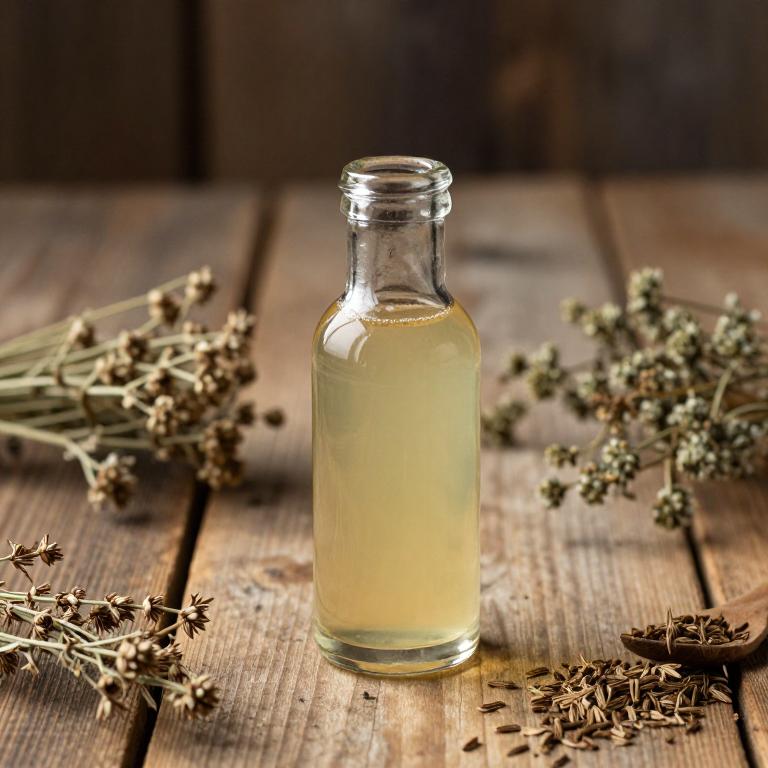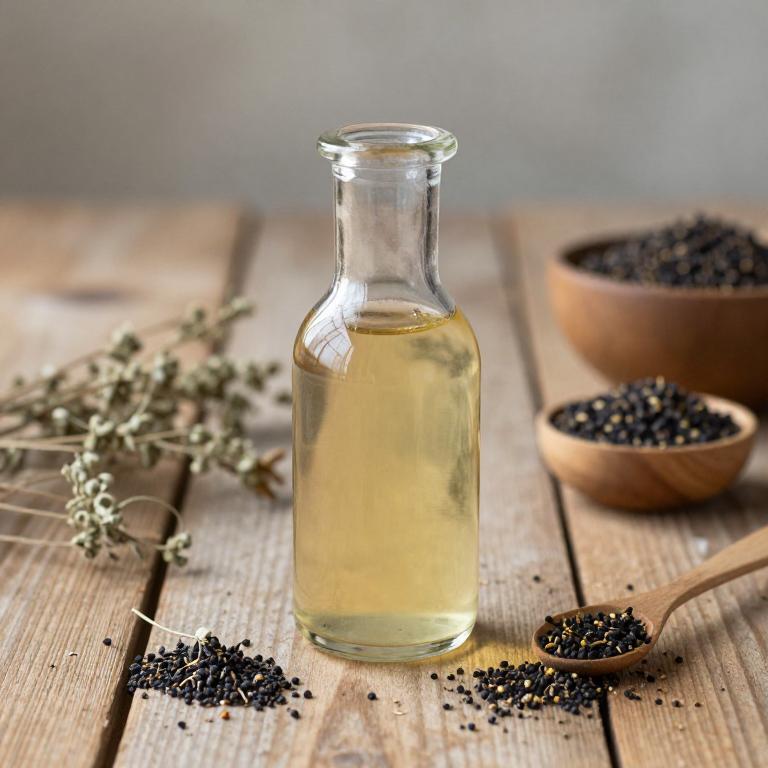10 Best Herbal Juices For Gallstones

Herbal juices have gained popularity as a natural alternative for managing gallstones, with certain herbs believed to support liver and gallbladder health.
Commonly used herbs include dandelion, milk thistle, and ginger, which are thought to aid in detoxification and reduce inflammation. These juices may help stimulate bile production and improve digestion, potentially alleviating symptoms associated with gallstones. However, it's important to consult a healthcare professional before relying solely on herbal juices, as they may not replace medical treatments for more severe cases.
While some people report benefits, scientific evidence supporting their effectiveness for dissolving gallstones remains limited.
Table of Contents
- 1. Thistle (Silybum marianum)
- 2. Turmeric (Curcuma longa)
- 3. Stinging nettle (Urtica dioica)
- 4. Peppermint (Mentha piperita)
- 5. Fennel (Foeniculum vulgare)
- 6. Cumin (Cuminum cyminum)
- 7. Dog rose (Rosa canina)
- 8. Black cumin (Nigella sativa)
- 9. Licorice (Glycyrrhiza glabra)
- 10. Ginger (Zingiber officinale)
1. Thistle (Silybum marianum)

Silybum marianum, also known as milk thistle, is a herbal remedy commonly used in the form of juice to support liver health and potentially aid in the management of gallstones.
The active compound in milk thistle, silymarin, is believed to have antioxidant and anti-inflammatory properties that may help protect the liver and promote the production of bile. While some studies suggest that silybum marianum juice may help dissolve gallstones or reduce the risk of stone formation, more research is needed to confirm its effectiveness in this regard. It is often recommended as a complementary therapy alongside conventional treatments for gallstones, but it should not replace medical advice or treatment.
As with any herbal supplement, it is important to consult with a healthcare professional before use, especially for individuals with existing health conditions or those taking other medications.
2. Turmeric (Curcuma longa)

Curcuma longa, commonly known as turmeric, contains curcumin, a compound with potent anti-inflammatory and antioxidant properties.
Some studies suggest that curcumin may help reduce gallstone formation by improving bile composition and promoting gallbladder function. However, there is limited clinical evidence supporting the use of turmeric juice specifically for treating existing gallstones. While turmeric is generally safe when consumed in moderate amounts, it should not replace medical treatment for gallstones, especially if symptoms are severe or persistent.
It is advisable to consult a healthcare professional before using turmeric or any herbal remedy for gallstone management.
3. Stinging nettle (Urtica dioica)

Urtica dioica, commonly known as stinging nettle, has been explored for its potential benefits in supporting liver and gallbladder health, including the management of gallstones.
Herbal juices made from fresh or dried stinging nettle leaves are believed to help detoxify the liver and promote the production of bile, which may aid in the dissolution of gallstones. Some alternative health practitioners recommend consuming nettle juice regularly as part of a holistic approach to reducing gallstone symptoms and preventing future stone formation. However, it is important to note that scientific evidence supporting the effectiveness of urtica dioica for gallstones is limited, and it should not replace conventional medical treatments.
As with any herbal remedy, it is advisable to consult a healthcare professional before incorporating nettle juice into a treatment plan for gallstones.
4. Peppermint (Mentha piperita)

Mentha piperita, commonly known as peppermint, has been traditionally used in herbal medicine for its digestive benefits, and some studies suggest it may support liver function and bile flow.
Herbal juices made from peppermint are often consumed to help alleviate symptoms associated with gallstones, such as bloating and indigestion, by relaxing the muscles of the bile duct. While peppermint juice may provide some relief, it is not a cure for gallstones and should not replace medical treatment. It is important to consult a healthcare professional before using peppermint or any other herbal remedy for gallstone management.
Overall, peppermint herbal juices can be a complementary therapy when used under proper guidance.
5. Fennel (Foeniculum vulgare)

Foeniculum vulgare, commonly known as fennel, has been traditionally used in herbal medicine for its potential benefits in supporting digestive health.
Fennel seeds and extracts are often recommended for their mild diuretic and antispasmodic properties, which may aid in the natural process of gallstone management. Some studies suggest that the essential oils in fennel, particularly anethole, may help in dissolving cholesterol-based gallstones by promoting bile flow and reducing inflammation in the gallbladder. However, it is important to note that while fennel juice may support overall liver and gallbladder function, it should not be used as a substitute for medical treatment for gallstones.
Always consult a healthcare professional before incorporating fennel or any herbal remedy into a treatment plan for gallstone-related conditions.
6. Cumin (Cuminum cyminum)

Cuminum cyminum, commonly known as cumin, has been traditionally used in herbal medicine for its potential digestive and liver-supporting properties.
Some proponents suggest that cumin juice may help in the treatment of gallstones by promoting bile production and improving the flow of bile through the gallbladder. However, there is limited scientific evidence supporting the efficacy of cumin juice in dissolving or preventing gallstones. While cumin is generally safe when consumed in moderate amounts, it is important to consult a healthcare professional before using it as a treatment for gallstones, as it may interact with certain medications or conditions.
Overall, cumin juice should not be considered a substitute for medical treatment but may be used as a complementary approach under professional guidance.
7. Dog rose (Rosa canina)

Rosa canina, also known as rosehip, is a traditional herbal remedy that has been used for centuries to support liver and gallbladder health.
Its high concentration of antioxidants, particularly vitamin C, may help reduce inflammation and improve bile production, which can be beneficial for individuals with gallstones. Some studies suggest that the bioactive compounds in rosehip juice may aid in the dissolution of small gallstones and prevent the formation of new ones. However, it is important to note that while rosa canina may offer supportive benefits, it should not replace medical treatment for gallstones, and individuals should consult with a healthcare professional before using it as a supplement.
As with any herbal remedy, the effectiveness and safety of rosa canina can vary depending on the individual and their specific health condition.
8. Black cumin (Nigella sativa)

Nigella sativa, commonly known as black cumin, has been traditionally used in herbal medicine for its potential health benefits, including supporting liver and gallbladder function.
Some studies suggest that the active compound in nigella sativa, thymoquinone, may help reduce inflammation and promote the dissolution of gallstones. While there is limited scientific evidence supporting its effectiveness for gallstones, some individuals use nigella sativa herbal juices as a complementary therapy alongside conventional treatments. It is important to consult a healthcare professional before using any herbal remedy, especially for conditions like gallstones, to ensure safety and appropriateness.
Overall, while nigella sativa may offer some supportive benefits, it should not replace medical advice or treatment for gallstone management.
9. Licorice (Glycyrrhiza glabra)

Glycyrrhiza glabra, commonly known as licorice root, has been traditionally used in herbal medicine for its anti-inflammatory and detoxifying properties.
Some studies suggest that the compounds in licorice root, such as glycyrrhizin, may help in the management of gallstones by reducing inflammation in the bile ducts and promoting bile flow. However, it is important to note that there is limited scientific evidence supporting its effectiveness specifically for dissolving gallstones. While some people may use licorice root juice as a natural remedy, it should not replace conventional medical treatments for gallstones.
Always consult with a healthcare professional before using any herbal remedy, especially if you have existing health conditions or are taking medications.
10. Ginger (Zingiber officinale)

Zingiber officinale, commonly known as ginger, has been traditionally used for its digestive and anti-inflammatory properties, and some studies suggest it may support liver and gallbladder health.
Ginger herbal juices, made by juicing fresh ginger root, are believed to aid in the digestion of fats and may help alleviate symptoms associated with gallstones, such as bloating and indigestion. However, while ginger is generally safe and may help reduce inflammation, it is not a proven treatment for gallstones and should not replace medical advice or conventional treatments. Individuals with gallstones should consult a healthcare professional before incorporating ginger juice into their regimen, as it may interact with certain medications or conditions.
Overall, ginger can be a beneficial complementary remedy, but it should be used with caution and under medical guidance.